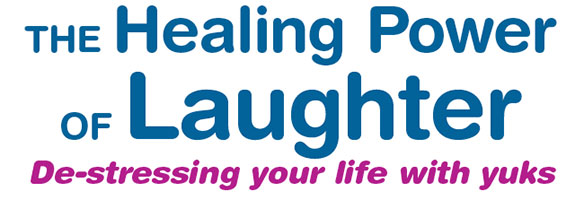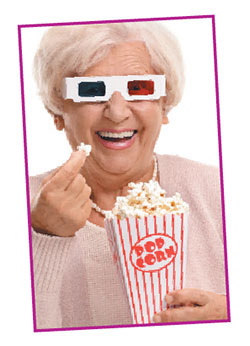
 Big cities and low self-esteem have a way of making you feel invisible. So, when I spent year after year going on stage at various comedy clubs around New York City, I sometimes felt invisible.
Big cities and low self-esteem have a way of making you feel invisible. So, when I spent year after year going on stage at various comedy clubs around New York City, I sometimes felt invisible.
People sitting in the audience appeared to be looking in my direction. I could hear laughter. I'd leave the stage, and on would come more comics.
Then, poof! Into the city I vanished. Nobody seeing the show knew my name except maybe a few of the other comedians.
One day, I was riding in a crowded subway car. I started looking for a seat or at least a place to stand where some 6-foot-2-inch guy wouldn't elbow me in the eye every time the train jolted.
As I moved through the car, I saw a nicely dressed woman pulling a little rolling luggage trolley coming up behind me. Just what you love to see on a jam-packed subway. "Luggage trolley" is third on the list of most annoying crowded bus or subway items right after "bicycle" and "loaded backpack."
I was halfway through the car and she was still coming. I walked to the end of the car; she was still coming. I had nowhere left to go. I was exasperated. I was about to have words with her.
 I turned around to face her. "Excuse me," she said, "Weren't you at The Comic Strip a couple of nights ago? I just wanted to tell you that I was having a really bad day and I wanted to kill my friends for dragging me out. But then you got me laughing and I kind of forgot about everything."
I turned around to face her. "Excuse me," she said, "Weren't you at The Comic Strip a couple of nights ago? I just wanted to tell you that I was having a really bad day and I wanted to kill my friends for dragging me out. But then you got me laughing and I kind of forgot about everything."
Laughter, whimsy, comedy...that's how powerful it is. Not only does it physically make you feel better, but it can transform your day. It can also give you a whole new perspective on a gruesome situation - even root canal. And I know a Raleigh dentist who can prove it.
During his 25-year career, Howie Shareff used empathy and silliness as key tools in his practice.
 "When a joke is painfully bad or a pun too outrageous," Shareff says, "how bad can the injection be?"
"When a joke is painfully bad or a pun too outrageous," Shareff says, "how bad can the injection be?"
His jocularity allowed patients to shift their anticipation of pain or distress into a bonding experience.
And then the dentist found himself in need of his own knee-slapping medicine: Disabling arthritis ended his long career. Was he depressed? Of course.
But instead of throwing a 24-hour pity party at his friendly neighborhood Facebook page, he founded You Call This Yoga
(youcallthisyoga.org). It's a nonprofit with a mission to help the physically challenged and underserved improve their life with the practice.
 Obviously, yuks don't have to come to us via a dentist or comedy club. We're all given our very own sense of humor and can use it to heal ourselves. It's a coping mechanism we're born with to help us emotionally repair.
Obviously, yuks don't have to come to us via a dentist or comedy club. We're all given our very own sense of humor and can use it to heal ourselves. It's a coping mechanism we're born with to help us emotionally repair.
A few years back, my dad died. The man had a lot of great qualities. One not-so-great quality: He was a reckless driver with road rage. When you're headed down the highway, wouldn't you feel a little stressed knowing the driver next to you is an angry 84-year-old with 24 percent heart capacity who's going 85 mph?
Jump ahead to his funeral. You know how the hearse usually moves about 25 mph so that all the cars behind can follow? Not my father's hearse!
There it was zipping past expressway exits, cutting people off, darting in and out of lanes. You'd think it would be hard to lose a big, shiny, black hearse in broad daylight, but we almost did...twice.
I had to laugh because there was only one person I knew who ever drove like that and he was horizontal in the back of the vehicle.
After my father passed, my husband and I had to go back and forth to Florida over the next two months to pack up his stuff and settle his affairs. While we were there, my cat died. Then my uncle, my father's brother, died.
Same funeral home. Same expressway. Probably the same hearse. Only this time, with no traffic in its path, the hearse crawled along like it was about to break down.
Again, it made sense: My uncle was the old man in the middle lane of I-95 doing 40 mph. I had to laugh because, considering its passenger, it just couldn't be a coincidence.
Just as our bodies come equipped with antibodies to fight illness and infection, I believe our playfulness is there to help us mentally and emotionally conquer both the infections we grow in our own thoughts and those that are inflicted on us by relatives, friends and supervisors.
Humor is, by nature, healing. An amusing comment should release the knots in your stomach, not create new ones. I know. You're thinking about people in your life who seem to have no hilarious side whatsoever. (I didn't realize you knew my father-in-law!)
Think about these people. How good are they at emotionally healing themselves? Do they seem happy, confident and well-adjusted? Not to me.
They're emotional drains to be around. They suck the energy out of every room. Lights dim. Cell phones must be charged.
Maybe the dentist's yoga could help them rebuild the muscles around their funny bone. As for the rest of us, it's good to have a go-to movie, book, story or joke in times of extreme stress. Deaths, births, marriage, divorce, marriage again, moving, staying, state affairs, world affairs, the state of world affairs...
It's just as important to constantly feed ourselves tiny particles of laughter throughout the day to handle everyday stresses: Supermarket lines, traffic, unruly children, customer service, ringing alarm clocks, broken coffeemakers, cold showers...
A day without humor. I can't even think about it. I'd never get out of bed.
Raleigh resident Lori Shandle-Fox is a humor writer and former stand-up comic. Her bits and pieces have appeared in The Washington Post, Newsday, Reader's Digest, The Philadelphia Inquirer and on NPR and GrokNation.com. Her book and blog series is "Laughing IS Conceivable" (laughingisconceivable.com)